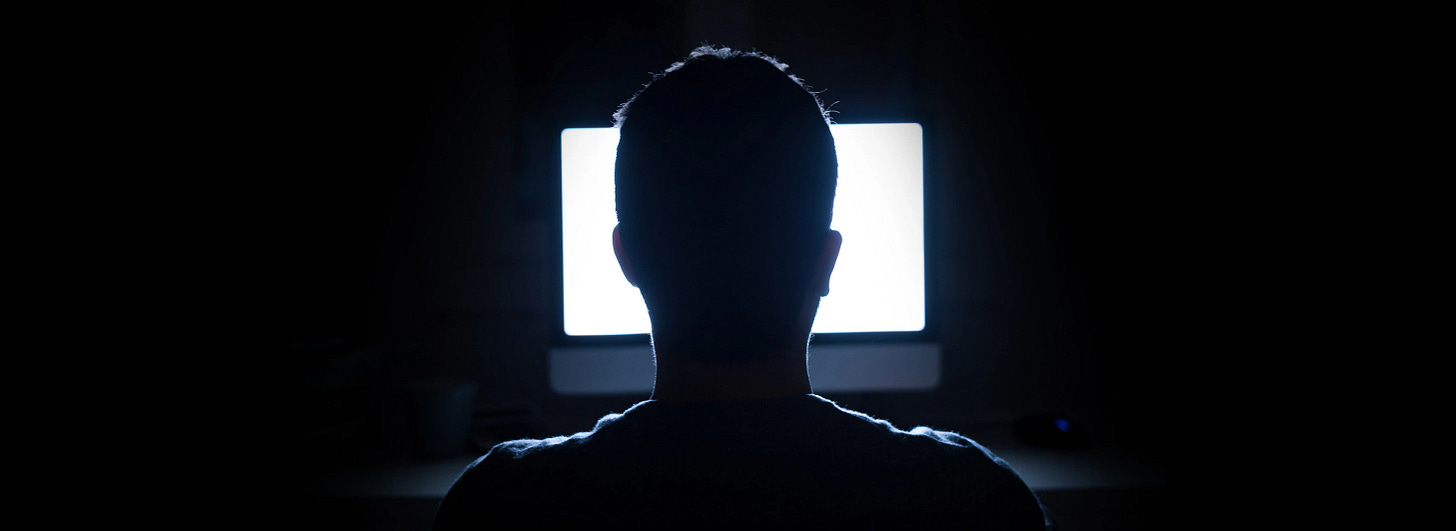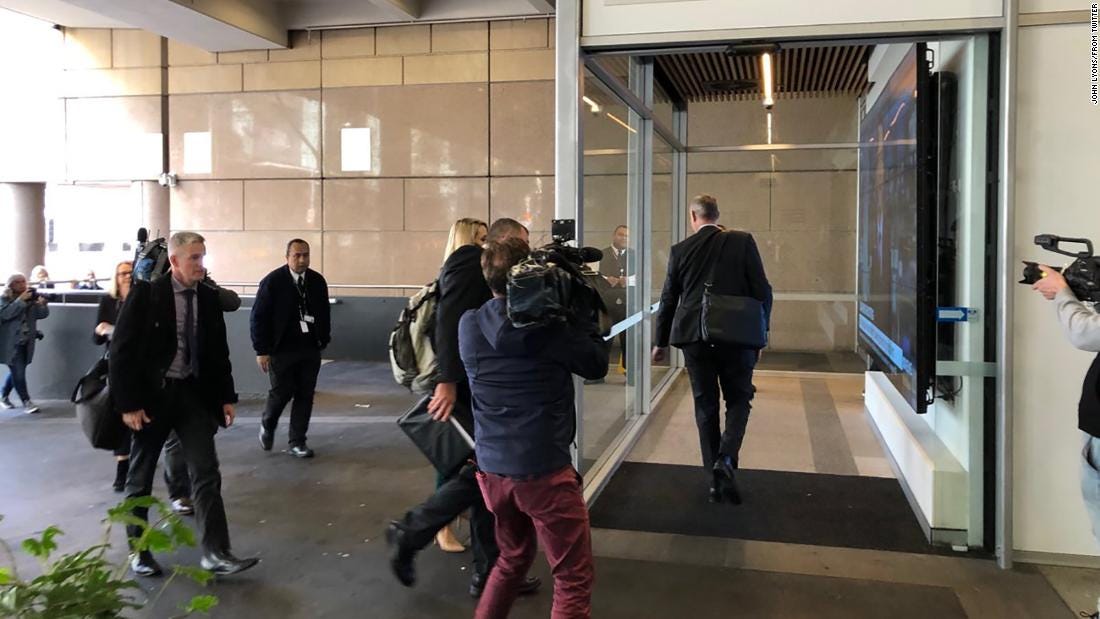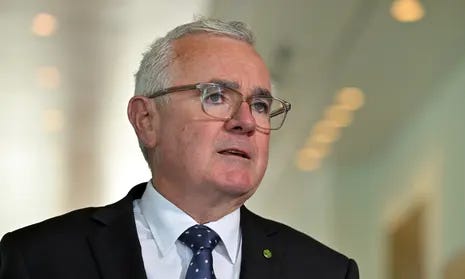Australia jails whistleblowers for telling the truth
Whistleblowers need robust protections to ensure those who expose evidence of serious crimes are supported, not silenced or punished.
By Maryanne Demasi, PhD and Magdalene L. D’Silva, BA/LLB, LLM, MA
On May 14, 2024, David McBride, a 60-year-old former military lawyer, was sentenced to five years and eight months in prison with a non-parole period of 27 months, for ultimately blowing the whistle on alleged war crimes committed by other Australian soldiers in 2013.
McBride initially tried to raise his concerns internally with the Australian Defence Force (ADF), but became unsatisfied with the process, so he set up a website and uploaded a trove of secret documents.
When ADF officials found the website containing classified material, they wrote to McBride reminding him of his duty not to disclose it, prompting him to take it down. No action was taken against McBride for his website leak and the Court noted in sentencing that those leaks gave rise to very little risk.
It was only after McBride leaked the material to ABC journalists who aired them in the ‘Afghan Files’ story alleging Australian soldiers did ‘kill people unnecessarily’ that McBride was arrested, interviewed and charged.
Federal police raided the ABC’s Sydney headquarters in 2019, searching for evidence of a leak, but decided against charging the journalists.
In 2023, McBride pleaded guilty to several charges, including stealing secret classified military documents and leaking them to journalists. However McBride couldn’t rely on those documents in his legal defence when the Australian government stopped them from being adduced as evidence on national security grounds.
McBride argued there was a “culture of cover-up” at the command level of the Australian Army. While most soldiers acted ethically, he said some were needlessly investigated and others were protected after allegedly, “put(ting) a gun to someone’s head and blow(ing) their head away” even if they were unarmed or handcuffed.
McBride says he felt a moral obligation to bring these issues to light, believing the Australian public deserved to know the truth about their country's military actions.
The years-long legal battle which has now landed McBride in prison, has sparked acrimonious debates about the need for an independent Whistleblower Protection Authority in Australia, and the media’s vital role in making powerful institutions accountable.
Human rights whistleblower lawyers said McBride’s punishment sends a chilling message to potential whistleblowers. They contend the Australian government should protect those who expose wrongdoing, not punish them.
Critics argued, however, that McBride was entitled and self-interested. Prosecutors suggested McBride had abandoned the internal investigation he initiated without waiting for the result, violated his signed confidentiality acknowledgments as a military lawyer, and compromised the lives of soldiers and their families while potentially harming Australia's national security and international relations.
The Brereton Inquiry, commenced by the ADF before McBride’s whistleblowing leaks, found credible information that Australian Special Forces had unlawfully killed people in Afghanistan.
It also appears no harm has been demonstrated because of McBride’s actions, though the ACT Supreme Court said in sentencing, that potential harm to Australia’s defence personnel, their families, Australia’s national security and international relations, still exists.
In sentencing McBride, ACT Supreme Court Justice David Mossop said that while he was a person of good character strongly devoted to duty, from his time in Afghanistan he was unable to accept that his opinions about the ADF may be incorrect.
Justice Mossop considered McBride knew he was committing a criminal offence when disclosing the information but hoped he would have a (public interest) defence. McBride had legal duties and constraints as a soldier and lawyer serving the Army, but no specific duty to disclose the secret information to outsiders when there were other legitimate ways he could have raised his concerns.
Justice Mossop also said McBride had no remorse and still believed he did the right thing, so he sentenced McBride to prison to deter him from disclosing anymore military information and to deter other people ‘with strong opinions’ who are also under a legal duty not to disclose information, from doing so.
McBride abandoned his defence of a higher duty to act in the public interest even if it involves disobeying orders, when the Court ruled this out. Yet he remained defiant, justifying his actions saying, “I served my country. I stand tall and I believe I did my duty and I see this as a beginning to a better Australia.”
In the lead up to his sentencing, he added “So long as people believe I stood up for what I believed in, I can go to jail with my head held high.”
Independent MP Andrew Wilkie was outraged by McBride’s prison sentence, saying that governments “hate people shining a light on official misconduct.”
He added, “They consistently want to punish the whistleblower, and they consistently want to send a signal to would be whistleblowers to shut up, to not break ranks, to not cause problems for governments.”
Daniela Gavshon, Australian Director of Human Rights Watch, said McBride’s sentencing shows that Australia’s whistleblowing laws need exemptions in the public interest.
“It is a stain on Australia’s reputation that some of its soldiers have been accused of war crimes in Afghanistan, and yet the first person convicted in relation to these crimes is a whistleblower not the abusers,” Gavshon said in a statement.
Many regard whistleblowing as morally courageous, especially when done in the public interest, as McBride claimed he did. But whistleblowing is a dangerous endeavour in Australia because of the significant legal and personal risks.
Compared to the US, where whistleblower protections are considered more robust, McBride’s case demonstrates the protracted and costly legal battles faced by whistleblowers in Australia, when up against institutions with unlimited resources.
It’s now feared McBride's prosecution and sentencing will deter other whistleblowers from disclosing information because Australia’s laws arguably do not protect whistleblowers like McBride, who try internal reporting channels first but then find them inadequate.
While there must be a balance between national security concerns and the public's right to know about the actions of their government and military, McBride’s case means other Australians thinking about whistleblowing, risk imprisonment too, especially where there is low trust in internal reporting channels and no alternative external reporting channel.
Australia’s Government has already announced plans to bolster public whistleblowing protections. But that won’t help McBride whose imprisonment highlights the urgent need for clear guidance and protection when disclosing information to prevent more serious harms, and the vital need for a free press if and when internal whistleblowing channels, fail.
Prior to being imprisoned, McBride recorded the following video - click on the photo










To assist briefly as Maryanne's co-author. Please see Justice Mossop's sentencing judgment linked in the story. It contains parts of David McBride's police interview which show he didn't plan to whistleblow on Australian soldiers and apparently distanced himself from the ABC story because his initial or main purpose was to protect those soldiers he considered were unfairly investigated for war crimes he says they didn't commit. Ultimately, McBride's disclosures seem to have revealed both.
And it really isn’t just Military secrets. Public servants are constrained by the public service act and national cabinet 20 year confidentiality. The truth only comes out with a Royal Commission like robodebt.
Remember the Sacked public servant who 'failed to conceal identity despite anonymous tweets'
https://amp.smh.com.au/politics/federal/sacked-public-servant-failed-to-conceal-identity-despite-anonymous-tweets-20190320-p515x0.html
We often are challenged by political decisions to stop the public knowing
Morrison with his 5 secret ministries was able to cover his tracks and we still don’t know what secret deals he made with Big Pharma under cover of Cabinet secrets and how many died in the Pandemic because no one could speak out